Zoom
Trash

Sleep. The role of sleep in memory. Why do we need sleep?
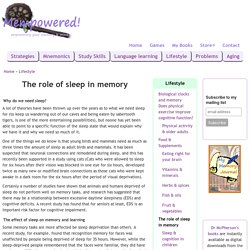
A lot of theories have been thrown up over the years as to what we need sleep for (to keep us wandering out of our caves and being eaten by sabertooth tigers, is one of the more entertaining possibilities), but noone has yet been able to point to a specific function of the sleep state that would explain why we have it and why we need so much of it. One of the things we do know is that young birds and mammals need as much as three times the amount of sleep as adult birds and mammals. It has been suspected that neuronal connections are remodeled during sleep, and this has recently been supported in a study using cats (Cats who were allowed to sleep for six hours after their vision was blocked in one eye for six hours, developed twice as many new or modified brain connections as those cats who were kept awake in a dark room for the six hours after the period of visual deprivation).
How to learn in your sleep. New information can be learned while asleep, and retained after waking.
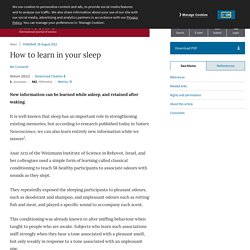
It is well known that sleep has an important role in strengthening existing memories, but according to research published today in Nature Neuroscience, we can also learn entirely new information while we snooze1. Anat Arzi of the Weizmann Institute of Science in Rehovot, Israel, and her colleagues used a simple form of learning called classical conditioning to teach 58 healthy participants to associate odours with sounds as they slept. They repeatedly exposed the sleeping participants to pleasant odours, such as deodorant and shampoo, and unpleasant odours such as rotting fish and meat, and played a specific sound to accompany each scent. This conditioning was already known to alter sniffing behaviour when taught to people who are awake. Sleep may help memories form by promoting new synapses. If you’ve just learnt something new and want to improve your chances of remembering it, you’d do well to sleep on it.
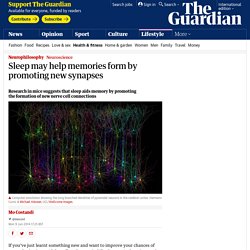
Whether you’re learning to play a musical instrument or revising for exams, a good night’s sleep afterwards – or even just a power nap – will aid long-term storage of the new memories and make it more likely they'll stick. We know that learning and memory involve the modification of synapses, the connections between nerve cells, but it wasn’t entirely clear how sleep aids memory consolidation. New research published in the journal Science seems to suggest that it does so by promoting the formation of new synapses and then stabilizing them. Learning induced the formation of new dendritic spines, the tiny, bulbous protuberances on the branches of neurons, which come into close contact with the nerve terminals of other cells to form synapses, the junctions at which the cells can communicate with each other.
Reference: Yang, G., et al. (2014). Sleep paralysis. Sleep paralysis is a phenomenon in which an individual, either during falling asleep or awakening, temporarily experiences an inability to move, speak, or react.
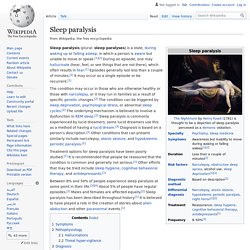
It is a transitional state between wakefulness and sleep, characterized by an inability to move muscles. It is often accompanied by terrifying hallucinations to which one is unable to react due to paralysis, and physical experiences (such as strong current running through the upper body). These hallucinations often involve a person or supernatural creature suffocating or terrifying the individual, accompanied by a feeling of pressure on one's chest and difficulty breathing. Strange Sleep Disorder Makes People See 'Demons' When filmmaker Carla MacKinnon started waking up several times a week unable to move, with the sense that a disturbing presence was in the room with her, she didn't call up her local ghost hunter.

She got researching. Now, that research is becoming a short film and multiplatform art project exploring the strange and spooky phenomenon of sleep paralysis. The film, supported by the Wellcome Trust and set to screen at the Royal College of Arts in London, will debut in May. Sleep paralysis happens when people become conscious while their muscles remain in the ultra-relaxed state that prevents them from acting out their dreams. The experience can be quite terrifying, with many people hallucinating a malevolent presence nearby, or even an attacker suffocating them.
Parasomnias: Nightmares, Night Terrors, Confusional Arousals and More. Sleep Disorders and Parasomnias Parasomnias are disruptive sleep disorders that can occur during arousals from REM sleep or partial arousals from non-REM sleep.
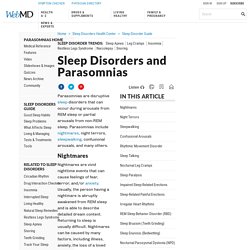
Parasomnias include nightmares, night terrors, sleepwalking, confusional arousals, and many others. Nightmares. Circadian Rhythm, Melatonin & Sleep-Wake Cycles. A feel-good brain chemical called dopamine has been linked to everything from laziness and creativity to impulsivity and a tendency to partake in one-night stands.

Now, we can add sleep regulation to that list. When dopamine latches onto its receptor in a special part of the brain, it seems to signal the body to "wake up" by turning down levels of the sleepiness hormone melatonin, the researchers found. The first clue to this new discovery came when researchers noticed that dopamine receptor 4, a protein on the outside of certain cells that binds to dopamine, was active in the part of the brain called pineal gland. This gland regulates our internal clock, known as our circadian rhythm, by releasing melatonin in response to light. Interestingly, the presence of this dopamine receptor on pineal gland cells seemed to cycle with the time of the day — the receptor numbers were higher at night and lower during the day. Circadian rhythm Melatonin muse "The system is expressed in the evening. Sleepiness: Cognitive and Emotional Effects. Sleepiness can damage your judgment, work performance, mood, and safety.

Why do I need to register or sign in for WebMD to save? We will provide you with a dropdown of all your saved articles when you are registered and signed in. By Camille PeriWebMD Feature Do you often forget things that you’re sure you know? Lack of sleep impairs cognitive ability - Science. Most Hopkins students accept that they often need to sacrifice sleep for work or fun.
And nearly everyone appreciates the effects chronic sleep deprivation can have on physical health and academic performance. But few stop for a moment to ask whether the status quo is acceptable. "I need to stay up later if I want to have a balanced college life. I don't mind not sleeping if I can have some fun before. And I stay up until I finish [my work], or otherwise I get up at 5 a.m. ," said one senior who echoed a common sentiment on campus. Lack of Sleep and Cognitive Function. Lack of Sleep May Be Linked to Beta-Amyloid Increase—A Risk Factor for Alzheimer's Disease - Sleep Review. Losing just one night of sleep led to an immediate increase in beta-amyloid, a protein in the brain associated with Alzheimer’s disease, according to a small, new study by researchers at the National Institutes of Health.
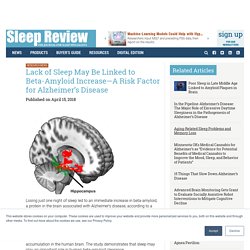
In Alzheimer’s disease, beta-amyloid proteins clump together to form amyloid plaques, a hallmark of the disease. While acute sleep deprivation is known to elevate brain beta-amyloid levels in mice, less is known about the impact of sleep deprivation on beta-amyloid accumulation in the human brain. The study demonstrates that sleep may play an important role in human beta-amyloid clearance. “This research provides new insight about the potentially harmful effects of a lack of sleep on the brain and has implications for better characterizing the pathology of Alzheimer’s disease,” says George F.
Koob, PhD, director of the National Institute on Alcohol Abuse and Alcoholism (NIAAA), in a release. Led by Ehsan Shokri-Kojori, PhD, and Nora D. Want to Sleep Better? First, Reduce Your Cortisol Levels then Follow These Six Key Tips. Trouble sleeping?

Your cortisol levels could be too high. Learn how to control them and get a good night's sleep. Here in America, recent statistics indicate that 1 in 8 people have difficulty falling or remaining asleep. Many adults are turning to drugs such as Ambien that have reported side effects like amnesia, sleep walking and unconscious "sleep-eating" during the night. Even preschoolers have insomnia. This phenomenon is a significant concern to us here at Body Ecology because deep sleep is one of the most fundamental ways our body heals itself. Newborn - Sleep Patterns - Lucile Packard Children's Hospital. What are the sleep patterns of a newborn? The average newborn sleeps much of the day and night, waking only for feedings every few hours. What does your sleep position reveal about your personality? - Healthy Living on Shine. These days, the way that I sleep simply says, "I am happy to be single and spending five to seven hours sprawled out in the center of my bed alone.
" At other points, my tightly squeezed eyes and curled-up body would have screamed, "I know the baby will wake up/someone will start snoring/the alarm will begin blaring as soon as I finally, finally, finally get to sleep. " Years and years ago, the corpse-looking college student still in her clothes would have mumbled something like, "Finals.
Older Adults Need Less Sleep. How much sleep we need is largely a mystery, and sleep seems tougher to come by as we age. Many studies — often funded by the pharmaceutical industry — have suggested that we're all sleep-deprived zombies, risking our health for lack of shut-eye. But new research in the U.K. confirms previous indications that older people need less sleep. It also suggests that variations in sleep hours needed are normal and healthy — so long as one is not overly sleepy during the day. Dement & kleitman ppt 2014. How to Improve Sleep Quality Using Easy REM Strategy. The Incredible Importance of Sleep for Habits & Motivation. By Leo Babauta For a long time, I underestimated the importance of sleep. Sure, I know that sleep is important for health and happiness and all of that … but it wasn’t until I learned two things that sleep took on a new importance for me: If you don’t get enough sleep, you will fail at changing habits; andIf you have a lack of sleep, your motivation will drop tremendously.
For years I focused on waking early so that I’d be more productive and be able to focus on my morning habits. But those two things were harmed by a lack of sleep. I could cite a bunch of studies and numbers, but here’s the honest truth: based on my own self-experiments, and working with thousands of people on habits, sleep is one of the most important but least valued factors when it comes to creating habits.
And in my own life, I’ve noticed that when sleep levels drop, my productivity drops. Here’s what happens: This pattern continues until I get enough sleep. Why ‘Sleep on It’ Is Our Most Useful Advice for Learning. A s a strategy for raising educational achievement, sleep should rank highly. Yet you will hear scant mention of sleep in the education discourse. For all the debate on curriculum and assessment, pedagogy and behavior management, so little attention is given to an issue that acutely affects our everyday lives. Sleep: The secret to a sound sleep lies inside the brain, researchers find - latimes.com.
I am frequently amazed by my husband's ability to sleep through all kinds of noises that cause me to wake in a flash -- car alarms, smoke detectors that are running low on batteries, and especially kids who have lost track of their favorite blankie in the middle of the night. Thanks to a new study being published in Tuesday's edition of the journal Current Biology, I now know that his brain probably produces more sleep spindles than mine. You see, while we're sleeping, the thalamus -- the part of the brain that receives sensory input like sounds -- tries to relay information to the cortex, where the sounds are actually perceived. Good sleep, good learning, good life. Foreword. How to nap.
How To Take An Effective Nap To Super Boost Your Productivity. “Sleep when you’re dead.” I’ve heard this more times than I can count. The idea is that you’ll have plenty of time to sleep when you die, so don’t waste your time while your alive.